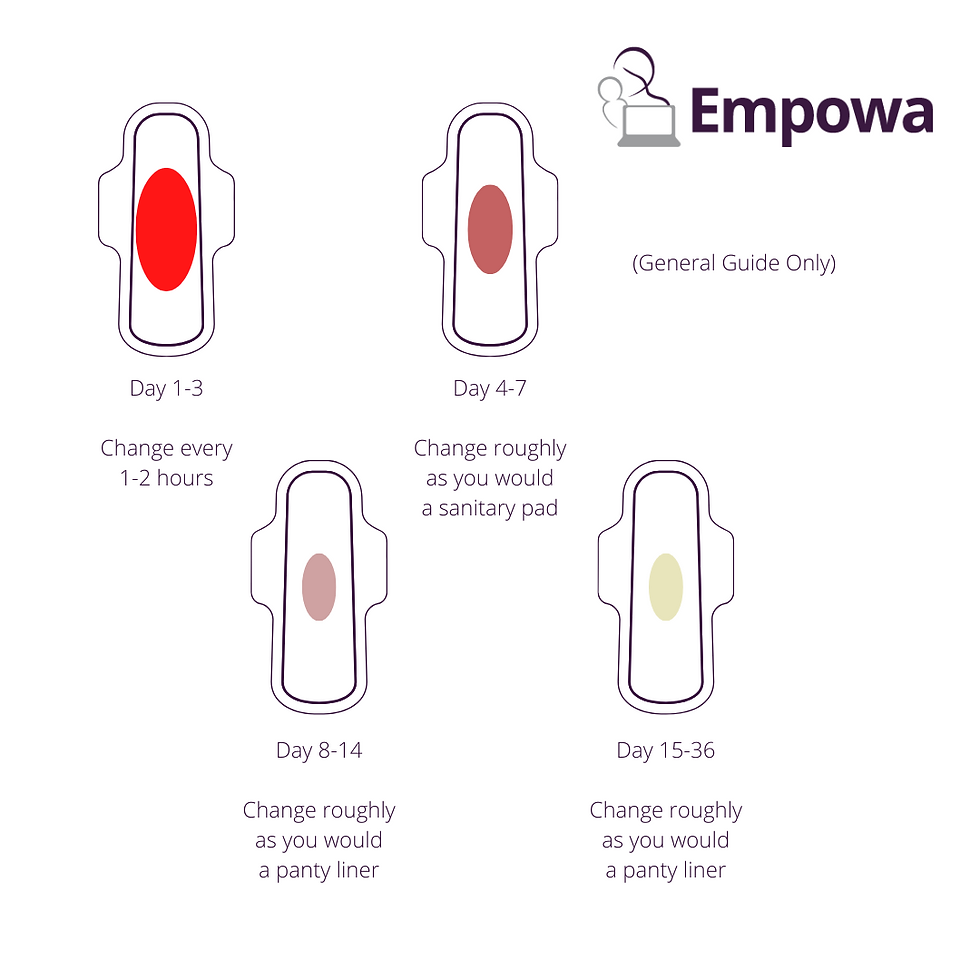Blood, Sweat and Tears
- Kathy @ Empowa

- Jun 25, 2021
- 3 min read
Updated: Feb 19, 2025
Postpartum Bleeding - the what, why and how to do
So you’ve been celebrating 9 months of no menstrual bleeding only to then feel like the whole nine months worth of menstrual blood is seeping out of you body. Combined with hormonal imbalances and you’ve got a hot, sweaty (probably smelly) mess of a mama and we feel absolutely yucky about it!!!
But modern advances have come to save the day (a little). I can’t make the uterus cramps and bleeding go away but I can explain what is happening and what you can do to make these couple of weeks more bearable.
This article is a quick summary answering some of the most commonly asked questions about postpartum bleeding. But please note (IMPORTANT) this is only a general guide. It is not intended as medical advice for your individual circumstances. Always seek further advice from your health care provider if you are worried or need more specific information.
The WHAT
Vaginal bleeding is normal after birth. The official name for it is “lochia” and it occurs whether you have a vaginal birth or a caesarean section birth.
The WHY
It happens because when you were pregnant there are blood vessels that run between your uterus and placenta. After birth the placenta comes away from the wall of the uterus and these blood vessels are now open, and they bleed until they heal fully. Oxytocin continues to be released in your body, due to lactation, and stimulates the uterine muscles to contract and also increases production of prostaglandins, which increase the contractions further. Your uterus is basically contracting to squeeze the bleeding vessels shut. Over 7–10 days your uterus continues to contract and the blood vessels begin to heal and bleed less.
HOW MUCH?
In the first 1–2 days you may soak up to one sanitary pad each hour and the blood will be bright red. Over several days, the bleeding will slowly get less each day and change colour from bright red to a pink or brown colour and then to a creamy colour. Most women will stop bleeding between four and six weeks after giving birth. Some women may bleed for longer or shorter than this.
You may have heavier bleeding:
• in the morning when you get up
• after breastfeeding
• after exercising
Passing blood clots is also common after having a baby. Maybe even the size of a golf ball in the first day but getting smaller as the days go on.

What can you do?
Day 1-3
Recommend wearing adult diapers or a maternity pad
Empty your bladder frequently (passing urine)
Use a gentle water spray to feel confidently clean
Feel for the top of your uterus to understand your body better. The top of your uterus (the fundus) can be felt around the level of your belly button. It will feel a bit like a grapefruit in size and texture. As your uterus contracts, it will slowly decrease in size and be felt lower down on your abdomen. Around 7–10 days after birth your uterus will have contracted so much that you can no longer feel it. You can ask your healthcare provider to help you find the top of your uterus so you will know what a well contracted uterus feels like. This will help you notice if your uterus does not continue to contract normally.
Day 4-7
Day 8-14
Day 15-36
Worried?
If you gave birth more than 24 hours ago and
You are still soaking more than one pad every 1–2 hours
The amount of bleeding suddenly increases or you suddenly pass large clots
The blood suddenly changes back to a bright red colour
You feel dizzy, weak, sweaty or have trouble breathing
Your vaginal discharge or blood smells, or you have a high temperature
You are worried that your bleeding is not normal
then CONTACT YOUR HEALTH CARE PROVIDER









Comments